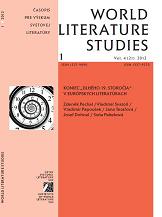Ruský symbolismus jako dialog alegorie a symbolu
Russian symbolism as a dialogue between allegory and symbol
Author(s): Zdeněk PechalSubject(s): Literary Texts
Published by: SAV - Slovenská akadémia vied - Ústav svetovej literatúry
Keywords: Modernism. Russian Symbolism. Symbol. Allegory. Meaning as a Free Happening. A. Blok. A. Bely. Kotik Letayev. Petersburg.
Summary/Abstract: In its theoretical program, Russian symbolism distinguishes itself against descriptive naturalism, set schemas, passive reproductions of reality and factographic positivism of the 19th century, but not against realism in general. In symbolism, similarly to other artistic styles (e.g., realism), there is a tension between the allegory and the symbol, that is, the tension between the allegorical image whose meaning is statically given and which implies limited pre-determined meaning, and the symbol, which is based on more immediate meaning-making free from determinants. Russian modernism programmatically emphasized its deviation from descriptive schemas and contributed to the renewal of meaning-making freedom in art. In the best examples of symbolist lyric poetry, meaning is created not through a static representation of mystical schema beyond the borders of our knowledge, but through the polyphony of concrete details of reality that points towards the difficulty of grasping the ideas of continuum and transformation.
Journal: World Literature Studies
- Issue Year: IV/2012
- Issue No: 1
- Page Range: 3-24
- Page Count: 22
- Language: Czech

